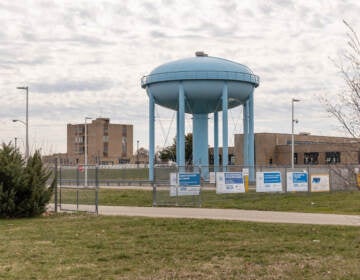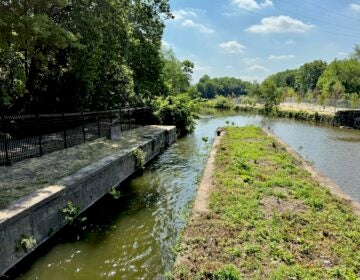Still filled: Schuylkill River dredging project near Boathouse Row stalls
A “contractual impasse” has brought the multimillion-dollar effort to a halt — with less than 5% of the dredging complete.

Rowers shrouded in fog move along the Schuylkill River in Philadelphia. (AP Photo/Matt Rourke)
The Schuylkill was supposed to be deeper by now.
After tons of sediment were removed from the riverbed, the waters — and the historic regattas that run along it in Philadelphia — were meant to be restored to their former glory. But more than a year later, the project is at a standstill.
Citing a “contractual impasse” with local contractor Atlantic Subsea Inc., the U.S. Army Corps of Engineers says the multimillion-dollar project has come to a halt — with less than 5% of the dredging complete.
In 2019, after years of fundraising, the River Restoration Committee of the Schuylkill Navy — the association of rowing clubs that use the portion of the Schuylkill near Boathouse Row — finally came up with the $4.5 million necessary to fund the project. The Army Corps of Engineers’ contract estimated removal of about 60,000 cubic yards, or 200,000 bathtubs-full, of built-up sediment. The dredging, which began in June of last year despite the coronavirus pandemic, would take place in three separate stages scheduled for completion on Dec. 13.
But when the project began, Atlantic Subsea encountered large pieces of river flotsam — telephone poles, railroad ties, big trees, and pilings — “dramatically larger debris” that it claims weren’t part of the original contract specifications.
“The unusually large items are now obstructing the dredge to move forward, making it impossible or impracticable to safely perform the dredging work within the methodologies and equipment permitted under the contract by the Army Corps of Engineers,” the contractor said in a statement.
On Nov. 9, Atlantic Subsea stopped all work on the project.
The Army Corps disagrees with ASI on the disputed debris. So do the rowers. And the Schuylkill may not be clear for a while longer.
What’s next?
Even before November, the dredging met with delays because of COVID-19 restrictions, environmental windows for fish migration and turtle-hatching cycles, and an unsecured barge from the project slamming into the Vine Street Bridge after flooding and winds from summer storm Isaias. That’s at least partly why, after nearly five months, there’s been little to no change in Schuylkill sediment levels.
It’s a disappointing result, especially after the time and resources spent on the river’s restoration by the clubs on Boathouse Row, universities with rowing programs, the three major regatta organizations, and individual donors, as well as city and state funds.
“We worked together for seven years to get [this project] off the ground with the hope that it would be completed by the end of 2020. A lot of different entities and a lot of different parties worked hard to make that happen, and everyone pulled their weight and did the work that they needed to do,” Schuylkill Navy commodore-elect Bonnie Mueller told WHYY News. “Everyone’s pulled together, everyone’s collaborated … it’s disappointing that ASI hasn’t been able to complete the work.”
Some of those costs just can’t be recouped. Last summer, in preparation for the dredge, the rowing clubs along Boathouse Row had to remove their docks and moor them temporarily elsewhere, hiring thousands of dollars’ worth of contractors, cranes, and storage. This month, they have to move them back into place — even though little about the river’s depth or safety for rowers has changed.
“The impact of the dredging project beginning and ending, without the contractor being able to complete the work, has been enormous for Boathouse Row,” Mueller said. “I would say north of a hundred thousand dollars.”
Given environmental restrictions on the project that limit the dredging calendar, work on the river likely won’t resume until at least June.
Meanwhile, Atlantic Subsea said it’s still committed to completing the project, and has proposed several alternative work plans. The Army Corps says it remains committed to the project, as well, and will continue to work through legal and contractual processes to complete the dredging.
“There are often challenges with marine construction, but this sort of situation is not a typical occurrence on these types of projects. With that said, there are contractual procedures in place for a reason, and we’re working through those processes now,” the Army Corps said in a statement.

Get daily updates from WHYY News!
WHYY is your source for fact-based, in-depth journalism and information. As a nonprofit organization, we rely on financial support from readers like you. Please give today.






